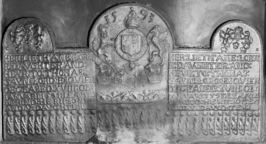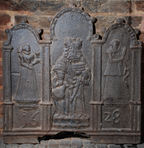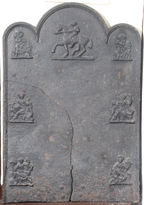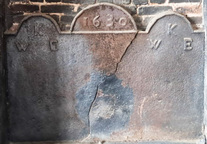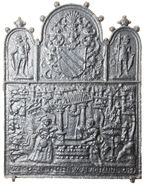-
200
Description: Composite; rectangular with semi-circular arches in middle (large) and ends (small) of top edge; rope on all edges except bottom; central panel effectively comprises an arched fireback form with Tudor royal arms (temp. Elizabeth I) with date above, and, below, letters G M, made from rope with fleur de lys terminals between two coronets surmounted by lions; below this are fronds with roses. On either side of this panel are placed the Anne Forster inscription panels; above each of these is a rose and crown with lion and dragon supporters, beneath which are three fleurs de lys. Along the base of the inscription panels and the central panel are single rows of ‘grape bunch’ shapes, beneath which are repeated trailing vine decoration from impressed wooden strips across the entire width of the fireback; 35 in all.
Notes: Formerly at Baynard's Park, Ewhurst, Surrey; GM probably refers to Sir George More, who built Baynards Park after buying the estate in 1587, and who moved to Loseley in 1604. The central coat of arms has been noted on two other firebacks, dated 1588 (no. 41) and 1595 (no. 482). The rose and crown stamps have been noted on a fireback in Haslemere Museum, and on examples illustrated by Lower (all of which bear the date 1582 and the initials IA; e.g. no. 107 or no. 472). The association of these stamps and the particular form of rope lettering, with the Anne Forster inscription and the ‘grape bunch’ shapes, both of which have been linked with other stamps from Pounsley furnace, suggests that they, too, were part of the stock of those works.
Inscription: 15 93 / GM / HER : LIETH : ANE : FORST/ R : DAVGHTER : AND : / HEYR : TO : THOMAS : / GAYNSFORD : ESQVIER / DECEASED : XVIII : OF: / IANVARI : 1591 : LEAVYNG / BEHIND : HER II : SONES : / AND : V : DAVGHTERS [twice]
Arms: Tudor royal
- Decoration tags:
- rectangular with three arches (shape)
- rope (edging)
- simple stamps
- carved stamps
- carved pattern panels
- individual letters
- individual numbers
- planklines
- heraldic
- armorial
- royal
- text
Manufactured: in 1593 possibly at Pounsley Furnace, Framfield in the Weald area of England.
Current location: not known.
Citation: Manning, O. & Bray, W., 1809, History of Surrey Vol. II (London, John White), p. 369n.
Citation: Ogilvy, J. S., 1914, A Pilgrimage in Surrey, vol. 2 (London, G. Routledge & Sons), p. 8.
-
888
Description: Triple arched rectangular shape, centre arch higher; each arch supported by pilasters; within centre arch, cloaked, bearded male figure wearing a crown and carrying a ewer and what appear to be a pile of plates; in left arch, above first half of date, a clothed female figure carrying a goblet and possibly a candle on a staff; in the right arch, above the second half of the date, a clothed female figure holding a distaff and a length of wool; there is a narrow panel at the bottom; on the outside of the arches are scroll-shaped protusions.
Notes: The shape of this fireback is relatively uncommon, and the significance of the figures may relate to a particular narrative.
Inscription: 16 28
- Decoration tags:
- rectangular with three arches (shape)
- complex individual (edging)
- carved stamps
- whole carved pattern
- individual numbers
- architectural
- text
- humans
Manufactured: in 1628 possibly in the Eifel area of Germany.
Current location: in private hands, Cowden, Kent, England.
- Attached to series:
- Figurine firebacks
-
108
Description: Quasi-rectangular with narrow arches at top ends and a broad low central arch, between which are flat-topped peaks linked to the arches by shallow concave curves; flanged edge (top and sides); mirroring the edge a channel has been engraved into the metal, extending into the small arches, producing the effect of a wide fillet along the top and sides with an inverted U-shaped return into the end arches; within the channel, at each end, a primitive representation of a vertical, hollow plant stem and four mirrored pairs of curved branches, with a vertical channel parallel to the edge joining the branch ends on the inside; between these is cast a small, rectangular panel with ovolo edging, bearing a full achievement of the arms of the Worshipful Company of Clothworkers; the date is centrally placed above this panel.
Notes: An usual fireback for several reasons: the use of engraving for significant elements of the design, the flanged edge, and the incorporation of a small fireback. The Clothworkers’ arms: Sable a chevron ermine between in chief two Havettes Argent and in base a Teazel Cob Or; crest: on a Mount vert a Ram statant Or; supporters: two Griffins Or pellettée; the arms as displayed were granted in 1587. An example of the armorial fireback on its own is in Petworth House (no. 522).
Inscription: WV 1659 WV
Arms: Worshipful Company of Clothworkers
- Decoration tags:
- rectangular with three arches (shape)
- flanged (edging)
- composite
- individual numbers
- planklines
- armorial
- text
Manufactured: in 1659 in the Weald area of England.
Current location: Haslemere Educational Museum, Haslemere, Surrey, England.
Museum number: 8587 (part of the Haslemere Educational Museum museum group)
- Attached to series:
- Composite firebacks
- Livery company firebacks
-
427
Description: Rectangular with three sem-circular arches on top, the middle arch higher and wider than the others; ovolo-moulded edging (top and sides); top centre, equestrian figure stamp; six small stamps of iconic figures down the sides, arranged in two columns.
Notes: An unusual fireback with stamps about 90mm high; the stamps are likely to have been cast from brass or iron mantelpiece ornaments, popular in the Victorian period. Formerly part of the J. H. Every collection.
- Decoration tags:
- rectangular with three arches (shape)
- ovolo (edging)
- carved stamps
- pictorial
- animals
- humans
Manufactured: in the 19th century in England.
Current location: Anne of Cleves House, Southover High Street, Lewes, East Sussex, England.
Museum number: 1944.24.089 (part of the Sussex Archaeological Society museum group)
- Attached to series:
- Ornament stamp firebacks
- Metalware stamp firebacks
-
1311
Description: Rectangular with three arches; twisted rope edging (top and sides); in each of the two outer arches, initials 'WKE' in triad; in the central arch, which is higher than the two outer ones and bordered at the base by twisted rope, the date 1630.
Notes: The triple arched form is unusual. The initials are presumed to refer to a husband and wife whose surname began with 'K'
Inscription: 1630 / WKE [triad] WKE [triad]
- Decoration tags:
- rectangular with three arches (shape)
- rope (edging)
- carved stamps
- individual letters
- individual numbers
- text
Manufactured: in 1630 possibly in the Shropshire area of England.
Current location: Castle Lodge, Castle Square, Ludlow, Shropshire, England.
Citation: Moran, M., 2003, Vernacular Buildings of Shropshire (Almeley, Logaston Press).
- Attached to series:
- Date & initials firebacks
-
573
Description: Rectangular with fillet sides and bottom; scrolled foliage on outside edges; date in narrow rectangular panel at bottom; central pictorial representation of four historical figures (see below), three male in mid-17th century armour, and one female; tripple arched top formed of rococo scrolls, a putto forming the middle arch.
Notes: The inscription may relate to the defeat of the Spanish at s'Hertogenbosch (den Bosch - ENDE BUSH) in 1629, and Wesel. von den Driesch states that the figures, from left to right, are: Prinz Fredrik Henrik of Oranje, his daughter, Luise Henriette, Prince Maurice of Nassau, and the Elector Friedrich Wilhelm of Brandenburg, who married Luise Henriette. German craftsmanship may account for the incorrect spelling of Dutch names. Mitford collection, Petworth House.
Copies of this fireback are known.
Inscription: PRESNTZI VAN WESEL ENDE BVSH / 1667
- Decoration tags:
- rectangular with three arches (shape)
- complex individual (edging)
- whole carved pattern
- pictorial
- historical
- royal
- text
- humans
Manufactured: in 1667 possibly in the Siegerland area of Germany.
Current location: Petworth House, Petworth, West Sussex, England.
Museum number: NT/PET/M/64 (part of the National Trust museum group)
- Attached to series:
- 'Dutch' Miscellaneous Firebacks
- Commemorative firebacks
-
529
Description: Rectangular with three arches, the middle one larger than the outer two; cavetto-moulded edging; bottom panel, pictorial scene of Jesus and the woman of Samaria at the well (John 4), with other figures, buildings etc. in the background, illegible text below; centre arch, shield, helm, crest and mantling of unidentified arms, the initials 'GP' in bottom corners; left arch, probable figure of a saint; right arch, probable figure of a soldier. Mitford collection, Petworth House.
Notes: The combination of a biblical scene (John 4) with a coat of arms.
Inscription: 16 30 / G P
- Decoration tags:
- rectangular with three arches (shape)
- cavetto (edging)
- whole carved pattern
- pictorial
- biblical
- armorial
- text
- humans
Manufactured: in 1630 possibly in the Eifel area of Germany.
Current location: Petworth House, Petworth, West Sussex, England.
Museum number: NT/PET/M/83 (part of the National Trust museum group)
- Attached to series:
- New Testament firebacks
- Foreign armorial firebacks
